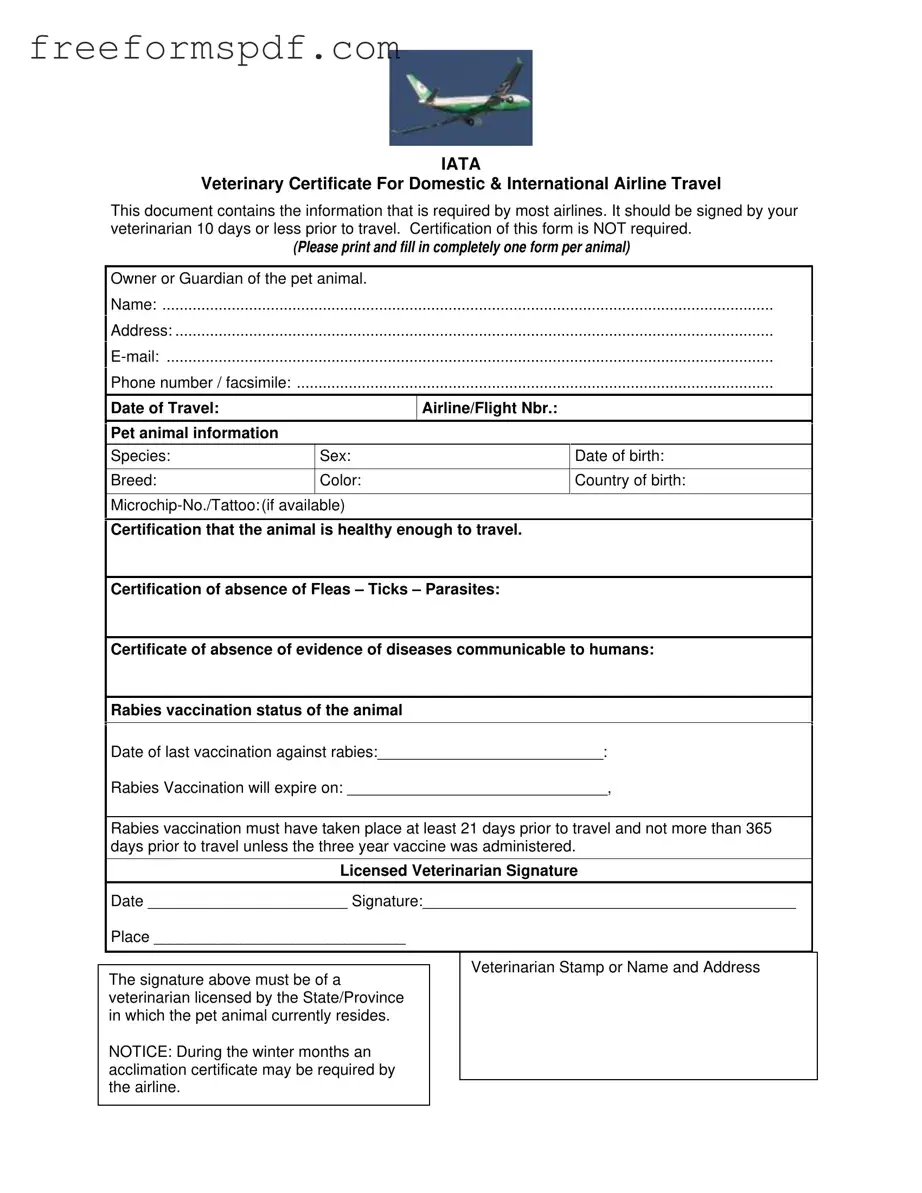Fill in a Valid Veterinary Certificate Travel Template
Common mistakes
When filling out the Veterinary Certificate Travel form, it’s essential to pay attention to detail. Common mistakes can lead to delays or even prevent travel altogether. Here are four mistakes people often make:
-
Incomplete Owner Information:
Many individuals forget to fill in all the required owner details. This includes the name, address, email, and phone number. Missing any of this information can lead to difficulties in contacting you or verifying ownership.
-
Incorrect Pet Information:
It’s crucial to provide accurate details about your pet. Errors in the species, breed, or microchip number can cause confusion. Always double-check that this information matches your pet's identification documents.
-
Failure to Meet Vaccination Requirements:
Rabies vaccination status is a key part of the form. Some pet owners neglect to ensure that the vaccination was administered at least 21 days before travel and not more than 365 days prior. This oversight can result in travel denial.
-
Missing Veterinarian Signature:
One of the most critical steps is obtaining the signature of a licensed veterinarian. If this signature is missing or if the veterinarian is not licensed in the appropriate state or province, the form may be deemed invalid.
By avoiding these common mistakes, you can ensure a smoother travel experience for both you and your pet. Always take the time to review the form thoroughly before submission.
Learn More on This Form
-
What is the purpose of the Veterinary Certificate Travel form?
The Veterinary Certificate Travel form is essential for both domestic and international airline travel with pets. It provides airlines with the necessary information regarding the health and vaccination status of the animal. The form must be completed and signed by a licensed veterinarian within 10 days of travel. This ensures that your pet is fit to travel and free from communicable diseases, which is crucial for the safety of both your pet and other passengers.
-
What information is required on the form?
When filling out the Veterinary Certificate Travel form, you will need to provide various details about both yourself and your pet. This includes:
- Your name, address, email, and phone number.
- The date of travel and details about the airline and flight number.
- Your pet's species, breed, sex, color, date of birth, and country of birth.
- Microchip number or tattoo, if applicable.
- Certifications regarding your pet's health, absence of fleas, ticks, or parasites, and rabies vaccination status.
Each section must be filled out completely, and it is important to ensure that the veterinarian's signature and stamp are included to validate the document.
-
How long before travel should the form be signed?
The form must be signed by a licensed veterinarian no more than 10 days prior to your travel date. This time frame is crucial because it ensures that the information about your pet’s health is current and accurate. If the form is signed too far in advance, it may not be accepted by the airline, as they require recent verification of your pet’s health status.
-
Are there any additional requirements during winter months?
Yes, during the winter months, airlines may require an acclimation certificate in addition to the Veterinary Certificate Travel form. This certificate verifies that your pet can safely endure the colder temperatures during travel. It is advisable to check with your airline ahead of time to ensure you have all necessary documentation, as requirements can vary between carriers.
Misconceptions
Here are six common misconceptions about the Veterinary Certificate Travel form:
- Certification is mandatory. Many people believe that certification of the Veterinary Certificate is required. In fact, it is not mandatory. You simply need to fill it out and have it signed by your veterinarian.
- Only international travel requires this form. Some think that this form is only necessary for international flights. However, it is also required for many domestic airline travels, depending on the airline's policies.
- One form is enough for multiple pets. It’s a common assumption that one form can cover multiple animals. Each pet requires its own completed form to ensure accurate information and compliance with airline regulations.
- Vaccination timing is flexible. Some travelers believe they can vaccinate their pets right before travel. In reality, the rabies vaccination must occur at least 21 days prior to travel and cannot be more than 365 days old unless a three-year vaccine was given.
- Any veterinarian can sign the form. There is a misconception that any veterinarian can complete the form. The signature must be from a veterinarian licensed in the state or province where the pet resides.
- Acclimation certificates are not needed. Many assume that acclimation certificates are unnecessary. However, during winter months, some airlines may require this additional documentation for pets traveling in cold weather.
Browse More Forms
Odometer Statement Indiana - It is an essential tool for anyone involved in buying or selling used cars.
The Homeschool Letter of Intent is an important document that parents in Arizona must complete to formally inform the state of their intent to provide homeschooling. For those seeking guidance on the submissions, the process and requirements can be explored in this helpful resource on the Arizona homeschooling letter of intent.
Well Agreement - Sets the framework for determining the capacity of the well to meet domestic water needs.
